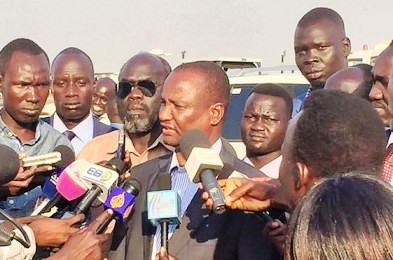SPLM-IO senior officials return to Juba, maintain 10 states
January 22, 2016 (JUBA) – After consultations in Pagak, their headquarters, Senior leaders of the armed opposition faction, the Sudan People’s Liberation Movement (SPLM-IO), have returned to the national capital, Juba, where they reiterated their rejection of the unilateral creation of 28 states.

Upon their return to Juba on Friday, the head of SPLM-IO advance team and chief negotiator Taban Deng Gai told reporter that consultative meeting reconfirmed to maintain the 10 states as provided for in the peace agreement.
“The leadership of IO recommended to insist and stick to the implementation of the agreement in spirit and later which means ten states,” said Gai, referring to states of South Sudan at the signing of peace agreement in August. President Salva Kiir has seen created eighteen states, bringing the total to 28.
Deng said if the government insist on 28 states and stall the formation of Transitional Government of National Unity (TGoNU), the parties will return to the mediators and the joint monitoring and evaluation commission (JMEC).
“In case of disagreement between us and the government, we shall ask JMEC to decide or report to the AU and the UN Security Council. This is important because we don’t want to disagree later,” he said.
Although the peace agreement was signed on the basis of 10 states, the government dissolved the 10 states and created 28 states. The opposition factions on the other hand said this was violating the agreement and insisted only the 10 states provided in the agreement should be the ones to be incorporated into the constitution.
James Gatdet Dak, spokesperson of the opposition’s leadership, told Sudan Tribune the summary of the resolution from the meeting is that the parties should continue to implement the peace agreement as it was signed.
He said the opposition group wanted “the provisions of the peace deal to be incorporated into the transitional constitution in its amendment so that it serves as the basis for formation of a transitional government of national unity”.
He however added that other matters which should be tackled by the parties through a consensus include the fate of presidential advisers which the agreement is silent about as well as filling of vacant posts in the parliament.
A composition of the joint police and military forces from the opposition, he added, were making the necessary preparations to move to Juba in the implementation of the security arrangements.
It is not clear if the parties will reach a compromise on the number of the outstanding issues including the number of states as the government insisted that the decision to create 28 states will not be reversed.
The Joint Monitoring and Evaluation Commission (JMEC), a body which is supposed to oversee and monitor the implementation of the accord, and chaired by former president of Botswana, Festus Mogae, seems to encourage consensus among the parties “outside the box” instead of strictly putting pressure on the parties to abide by the agreement.
(ST)
